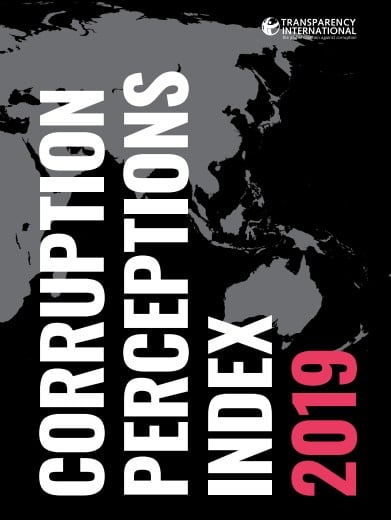The news from Transparency International is not good.
This year’s Corruption Perceptions Index (CPI) reveals that a majority of countries are showing little to no improvement in tackling corruption.
Our analysis also shows corruption is more pervasive in countries where big money can flow freely into electoral campaigns and where governments listen only to the voices of wealthy or well-connected individuals.
Corruption is difficult to quantify, so the worldwide anti-corruption group ranks 180 countries and territories by their “perceived levels of public sector corruption, according to experts and business people.”
It uses a scale of zero to 100, where zero is highly corrupt and 100 is very clean. More than two-thirds of countries score below 50 on this year’s CPI, with an average score of just 43. Similar to previous years, the data shows that despite some progress, a majority of countries are still failing to tackle public sector corruption effectively.
The report takes a close look at money and politics this year and concludes that the analysis “suggests that reducing big money in politics and promoting inclusive political decision-making are essential to curb corruption.”
There was good news too.
In the last year, anti-corruption movements across the globe gained momentum as millions of people joined together to speak out against corruption in their governments. Protests from Latin America, North Africa and Eastern Europe to the Middle East and Central Asia made headlines as citizens marched in Santiago, Prague, Beirut, and a host of other cities to voice their frustrations in the streets.
The authors note that citizens are “fed up with corrupt leaders and institutions.”
This frustration fuels a growing lack of trust in government and further erodes public confidence in political leaders, elected officials and democracy. The current state of corruption speaks to a need for greater political integrity in many countries. To have any chance of curbing corruption, governments must strengthen checks and balances, limit the influence of big money in politics and ensure broad input in political decision-making.
Here’s how the US fared:
With a score of 69, the United States drops two points since last year to earn its lowest score on the CPI in eight years. This comes at a time when Americans’ trust in government is at an historic low of 17 per cent, according to the Pew Research Center. The US faces a wide range of challenges, from threats to its system of checks and balances,
After the 2018 national elections, which were strongly influenced by and the ever-increasing influence of special interests in government, to the use of anonymous shell companies by criminals, corrupt individuals and even terrorists, to hide illicit activities. While President Trump campaigned on a promise of “draining the swamp” and making government work for more than just Washington insiders and political elites, a series of scandals, resignations and allegations of unethical behaviour suggest that the “pay-to-play” culture has only become more entrenched.21 In December 2019, the US House of Representatives formally impeached President Trump for abuse of power and obstruction of Congress.
